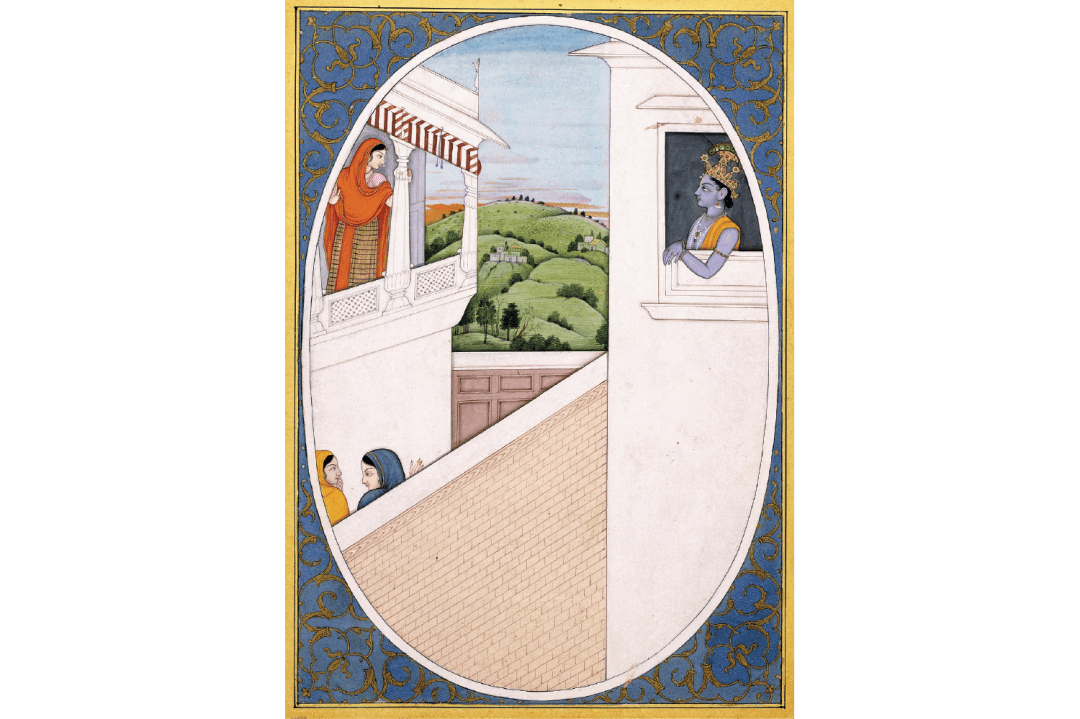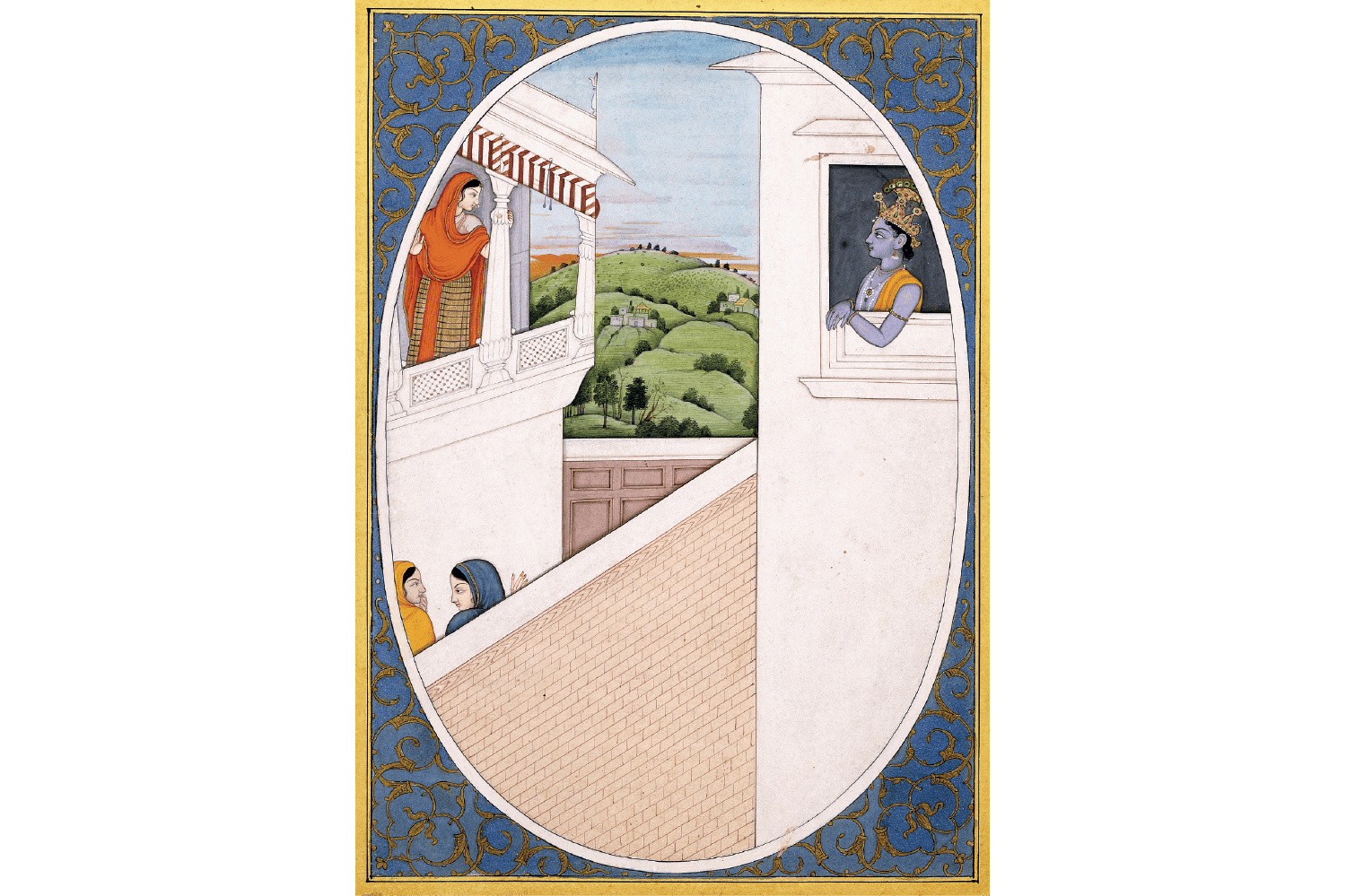The first European translation of the Bhagavad Gita, a dialogue between Prince Arjuna and Lord Krishna, appeared in English in 1785. Strangely, this classic of Indian spirituality, which is much concerned with liberation, was prefaced with talk of conquest, rightful dominion and chains of subjection.
The translation had been produced under the auspices of the English East India Company, then in the process of claiming for itself ever-larger swaths of territory in India. The first edition incorporated a letter written by the governor-general in Calcutta, Warren Hastings, in which he compared the Gita with Homer and Milton. He also noted its usefulness as a source of intelligence on a newly subject people and the potential for English interest in the Gita to soften Indians’ hearts towards their rulers.
Jones’s ground-breaking argument in favour of ‘Asiatic poetry’ was soon in the hands of Goethe
Hastings even hoped that some of the young men going out to India to earn some fast money as Company traders might read the Bhagavad Gita and be drawn away from what he rather diplomatically described as ‘meaner occupations’. These included alcohol, opium, gambling, mistresses, prostitutes, tobacco, illicit money-making and violent crime.
When, in our own times, conversations about the British empire tend to degenerate into the asserting of polarised positions – ‘stain on our history’ versus ‘what about the railways?’ – it is remarkable to look back and find colonial politics intertwining with appreciation for India’s sacred literature.
This year marks the 250th anniversary of a milestone in that process: the publication, by the lawyer and linguist Sir William Jones, of a ground-breaking argument – made first in English and then again in scholarly Latin, garnering him a wider audience – in favour of ‘Asiatic poetry’.
European poetry had become dry and repetitive of late, Jones claimed: the same old images and allusions. It was time for Europeans to drop their narrow worship of Greece and Rome, abandon their squeamishness about ‘Eastern’ languages such as Arabic and Persian, and open themselves up to fresh inspiration. Poeseos Asiaticae Commentariorum Libri Sex (1774) was soon in the hands of readers, including Goethe and Thomas Jefferson.
Jones went on to serve as a judge on the Supreme Court in Calcutta, borrowing the Grand Jury Room one day in 1784 to hold the first meeting of a new ‘Asiatic Society’. He set about learning Sanskrit at the feet of a teacher, Ramalocana, who is said to have insisted on holding classes in a marble-floored room – the easier to cleanse it of Jones’s polluting presence afterwards, using Ganges water.
The ‘language of the gods’, as some called it, gave Jones and his colleagues access to stories of Indian deities, revered spiritual works including the Upanishads, the plays of Kalidasa – India’s Shakespeare, as far as Jones was concerned – and the philosopher Adi Shankara.
Jones provided compelling evidence for the idea that Sanskrit shared a common ancestor with Latin and Greek – so much so, in fact, that Jones went via Latin when translating Sanskrit into English. This helped to shift some westerners’ attitude towards India from being a far-flung place radically unlike the West, to something more like family – reunited at last.
Jones provided evidence for the idea that Sanskrit shared an ancestor with Latin and Greek
In which case, ought the East India Company to have packed its bags and gone home? Did one treat family as the infamous Robert Clive had the people of Bengal: stealing treasure and contributing to catastrophic famine?
Jones thought the Company should stay put. Though sympathetic towards demands for independence in America, in a letter to Edmund Burke he claimed that Indians were so unused to freedom that to impose liberty upon them would be a kind of tyranny in itself. Government by ‘absolute power’ was called for – accomplished according to local laws, discerned by learning languages such as Sanskrit.
Jones was conservative, too – or at least careful – in addressing the thorny question of what Asia’s languages and religions might imply for biblical claims about ancient history. He suggested that perhaps Noah and his family had settled in northern Persia after the Flood, fanning out across the world from there and taking with them a single language: the first ancestor of Sanskrit, Latin and Greek, among others.
Closer to Jones’s heart were the consolations of Indian philosophy. A man of universalist, poetic and even mystical leanings, he was deeply impressed by the similarities that he found between Pythagoras, Plato, Sufism and Indian sages such as the 8th century Shankara.
What most struck Jones about Shankara was his claim that reality, as people in their natural ignorance commonly experience it – an individual self, surrounded by other people and objects – is ultimately maya (illusion). The truth is Brahman: a single consciousness or creative principle, unconditioned and free, with which a person’s deepest self (atman) is identical.
Jones tried to express these and other ideas in ‘hymns’ addressed to Hindu deities. They included Narayena, one of the forms of Vishnu, whom Jones described in distinctly Christian terms as ‘the spirit of God… moving on the water.’ To get beyond ignorance and gain a taste of the ultimate reality that such deities expressed was the highest goal of a person’s life, as revealed in his ‘Hymn to Narayena’:
‘Delusive Pictures! unsubstantial shows!
My soul absorb’d One only Being knows,
Of all perceptions One abundant source,
Whence ev’ry object ev’ry moment flows:Suns hence derive their force,
Hence planets learn their course;
But suns and fading worlds I view no more:
God only I perceive; God only I adore.’
Samuel Taylor Coleridge was among those attracted to what he learned, from Jones and others, of a contemplative dimension in Indian thought and mythology. Longing to recapture childhood experiences of what he called ‘the Vast’, Coleridge confided in his friend John Thelwall: ‘I should much wish, like the Indian Vishnu, to float about along an infinite ocean cradled in the flower of the Lotus, and wake once in a million years for a few minutes just to know that I was going to sleep a million years more.’
In Germany, Goethe shared Jones’s love of Shankara and agreed that Kalidasa made contemporary European playwrights appear pitiful by comparison – relying, as Goethe put it, on ‘caricatures and stupid priests’. Ludwig van Beethoven scribbled quotes from Jones’s ‘Hymn to Narayena’ in his diary. He also reproduced sections from the Bhagavad Gita: ‘Let the motive be in the deed, and not in the event. Be not one whose motive for action is the hope of reward.’
A line from Jones’s ‘Hymn to Narayena’ turned up, too, in the private journal of the American essayist Ralph Waldo Emerson: ‘God only I perceive; God only I adore.’ As a young man, he had taken a rather dark view of India. His poem ‘Indian Superstition’, penned for Harvard’s College Fair in his graduating year of 1821, was about as generous to its subject matter as the title suggests. But his Aunt Mary persuaded him to look again: at Jones’s work, and at that of the influential writer and reformer Ram Mohan Roy.
By the mid-1830s, Emerson was lecturing graduates at Harvard’s Divinity School on the dangers of preaching a Christianity that was overly literal and tied to ancient history. ‘I look for the hour,’ Emerson declared, ‘when that supreme Beauty, which ravished the souls of those eastern men… shall speak in the West also.’
Indian wisdom had the potential not just to lift westerners up, but to keep Indians down. To depict India as a land of passive, contemplative sorts – devoted to a god who likes to lounge around for a million years at a time – played into the hands of those who justified colonial rule on the basis of a very particular reading of history. The British, it was claimed, were steadily raising up a good and kindly people who had for too long been struggling under despotic Brahmin priests and Mughal emperors.
Meanwhile, the western love affair with India sometimes turned sour. Coleridge found it lacking in the end. Deeply aware of his own sin and despair, he was convinced of the importance of will, morality, reason and grace in humankind’s relationship with the divine. If such things were simply part of maya, widely misunderstood in the West as a giant conjuring trick, then Shankara’s philosophy amounted to little more than a ‘painted Atheism’.
Here was a tension destined to run through modern western engagement with Asian wisdom: between vision and conduct. Advocates for ‘the East’ in the counter-culture era often preferred the former, determined to leave behind the dreary lives and mores of their parents’ generation. This upset Asian-Americans, whose Buddhism and Hinduism was highly ethical, and who were seeking to integrate into American society rather than be associated with its repudiation.
Vision without a commanding moral critique also left the counter-culture generation’s interest in Asia vulnerable to satire, allegations of cultural appropriation and co-option of the sort seen more recently in the commercialisation of mindfulness and wellness. And yet morality without vision may end up brittle or nostalgic, with little to say to those who feel excluded or unmoved by its loudest voices.
The challenge of connecting vision with morality feels pressing now. And yet it is one with which I suspect William Jones, a quarter of a millennium ago, would have felt entirely at home.
The Light of Asia: A History of Western Fascination with the East, by Christopher Harding, is published by Allen Lane.







Comments